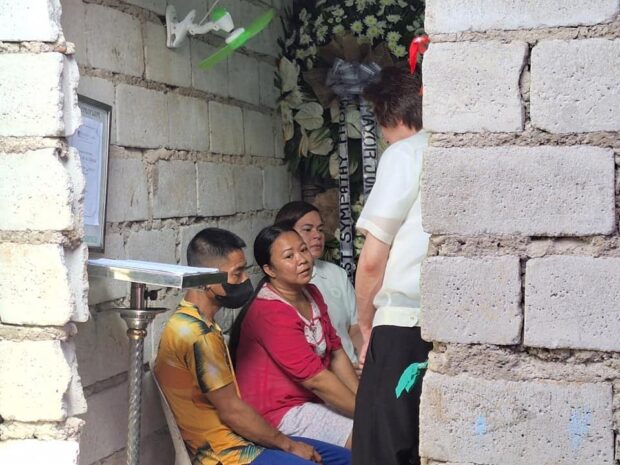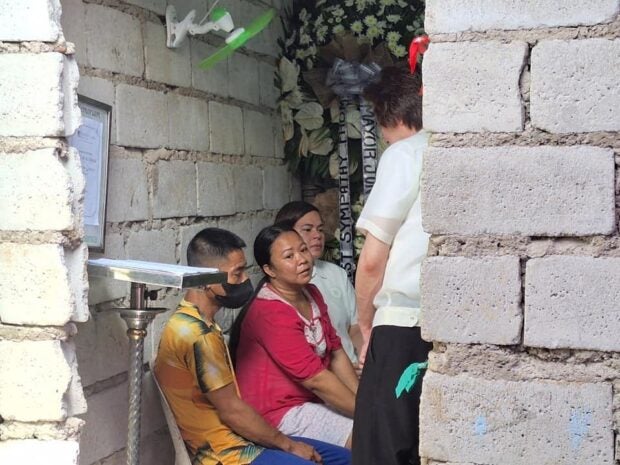
Vice President Sara Duterte, who also heads the DepEd, visits the wake of Francis Jay Gumikib, the Grade 5 student who died 11 days after his teacher allegedly slapped him, in Antipolo City on Friday, Oct. 6, 2023. (Photo courtesy of Rizal Police Provincial Office)
MANILA, Philippines — According to the autopsy conducted by the police, the 14-year-old student who died days after he was slapped by his teacher had a “rare” condition that caused a blood vessel in his brain to rupture.
Lt. Col. Ryan Manongdo, Antipolo City police officer in charge, said on Wednesday night that the examination of Francis Jay Gumikib’s body showed that the slapping incident was not related to his death.
As a result, the police would file a criminal complaint only for physical injury in relation to child abuse against the teenager’s teacher, he added.
“The [medicolegal officers of the PNP Forensic Group] explained to us the result of the autopsy and it stated that a rare condition was the cause of death,” Manongdo said.
‘Nontraumatic in nature’
In a press briefing earlier in the day, Lt. Col. Maria Anna Lissa dela Cruz said their findings “showed [that the cause of death] was cerebral edema secondary to intra-cerebral hemorrhage [swelling and bleeding in the brain] consistent with ruptured arteriovenous malformation [a group of blood vessels that form incorrectly].”
The chief medicolegal officer of the Rizal provincial field unit of the Philippine National Police Forensic Group (PNP-FG) said the blood vessel rupture in Gumikib’s brain was “nontraumatic in nature,” caused by a disease she did not disclose.
“Mostly, it’s a rare condition, but it’s the most common cause of intracerebral hemorrhage considering the age group of our patient,” she added.
‘Expert opinion’
According to Dela Cruz, symptoms of the disease, such as brain hemorrhage, occur in patients between the ages of 1 and 18. “At first, this disease is asymptomatic and shows no symptoms. But since the blood vessels in their brain are fragile, they can rupture or burst simultaneously or spontaneously,” she said.
Asked by reporters if a slap could have caused the blood vessel in Gumikib’s brain to rupture, Dela Cruz declined to answer but said: “In this case, the hemorrhage as backed up by the CT scan from the hospital came from the innermost area [of the brain].”
Pressed further, PNP-FG director Brig. Gen. Constancio Chinayog Jr. replied, “As I said, we arrived at an expert opinion and we will not divulge [it] yet now because we have yet to inform [Gumikib’s] family.”
He also cited the same reason for their refusal to give media a copy of the autopsy report, saying, “We first have to explain to them what is the opinion of our medicolegal officers.”
But he added that the report had already been forwarded to the Antipolo City police, which would be in charge of filing a case against Gumikib’s teacher.
Meningoencephalitis
Dela Cruz’s findings seemed to echo the assessment of forensic pathologist Raquel Fortun who earlier said that the student’s family should “keep an open mind” that his death might not be due to trauma (external force) but other causes, including a rare condition called meningoencephalitis.
“Because this presentation is also consistent with inflammation from an infection of the brain and the surrounding meninges, or the covering of the brain. So it’s really possible that it is caused by meningoencephalitis,” Fortun had stressed.
Patients with meningoencephalitis exhibit symptoms both of meningitis and encephalitis, including sudden fever, severe headache, nausea and vomiting, double vision, fatigue or weakness, and loss of consciousness.
Days after he told his mother that his teacher at Peñafrancia Elementary School in Antipolo City had slapped him on the right ear, Gumikib was brought to the hospital on Sept. 26. He complained of a severe headache, vomiting, blurred vision and said he had felt “something crawling inside his ear.”
90-day suspension
While confined, the Grade 5 student fell unconscious and lapsed into a coma. He was pronounced dead by his doctor on Oct. 2 and based on the death certificate released by the hospital, Gumikib’s immediate cause of death was “global brain edema.”
Upon the request of his family, the PNP conducted the autopsy to determine his cause of death while the Department of Education ordered a fact-finding team to investigate the case.
ALSO READ:
DepEd-7 chief to teachers: Don’t use corporal punishment on misbehaving students
Mandaue student dies of lung disease months before graduation
Student from Cebu inspires netizens with his resourcefulness
